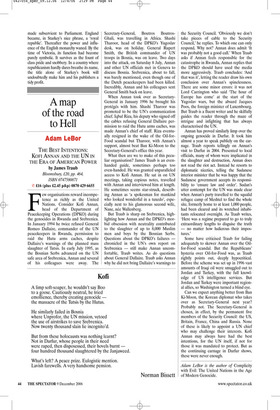A map of the road to Hell
Adam LeBor
THE BEST INTENTIONS: KOFI ANNAN AND THE UN IN THE ERA OF AMERICAN POWER by James Traub Bloomsbury, £20, pp. 464, ISBN 0747580871 ✆ £16 (plus £2.45 p&p) 0870 429 6655 Few organisations reward incompetence as richly as the United Nations. Consider Kofi Annan, head of the Department of Peacekeeping Operations (DPKO) during the genocides in Rwanda and Srebrenica. In January 1994 he twice refused General Romeo Dallaire, commander of the UN peacekeepers in Rwanda, permission to raid the Hutu arms caches, despite Dallaire’s warnings of the planned mass slaughter of Tutsis. In early July 1995, as the Bosnian Serbs advanced on the UN safe area of Srebrenica, Annan and several of his colleagues were away. The Secretary-General, Boutros BoutrosGhali, was travelling in Africa. Shashi Tharoor, head of the DPKO’s Yugoslav desk, was on holiday. General Rupert Smith, the British commander of UN troops in Bosnia, was on leave. Two days into the attack, on Saturday 8 July, Annan and other UN officials met in Geneva to discuss Bosnia. Srebrenica, about to fall, was barely mentioned, even though one of the Dutch peacekeepers had been killed. Incredibly, Annan and his colleagues sent General Smith back on leave.
When Annan took over as SecretaryGeneral in January 1996 he brought his protégés with him. Shashi Tharoor was promoted to be the UN’s communication chief. Iqbal Riza, his deputy who signed off the cables refusing General Dallaire permission to raid the Hutu arms caches, was made Annan’s chief of staff. Riza eventually resigned in the wake of the Oil-forFood scandal but Tharoor, with Annan’s support, almost beat Ban Ki-Moon to the Secretary-General’s office this year.
What then are we to make of this peculiar organisation? James Traub is an evenhanded guide, sometimes perhaps too even-handed. He was granted unparalleled access to Kofi Annan. He sat in on UN meetings, taking copious notes, travelled with Annan and interviewed him at length. He sometimes seems star-struck, describing Annan as ‘a spokesman for mankind who looked wonderful in a tuxedo’, especially next to his glamorous second wife, Nane, née Wallenberg.
But Traub is sharp on Srebrenica, highlighting how Annan and the DPKO’s morbid obsession with neutrality contributed to the slaughter of up to 8,000 Muslim men and boys by the Bosnian Serbs. Questions about the DPKO’s failures chronicled in the UN’s own report on Srebrenica — still make Annan uncomfortable, Traub writes. As do questions about General Dallaire. Traub asks Annan why he did not bring Dallaire’s warnings to the Security Council. ‘Obviously we don’t take pieces of cable to the Security Council,’ he replies. To which one can only respond, Why not? Annan does admit ‘It was probably not a good call.’ When Traub asks if Annan feels responsible for the catastrophe in Rwanda, Annan replies that the DPKO should have used the media more aggressively. Traub concludes: ‘And that was it’, letting the reader draw his own conclusion over Annan’s spinelessness. There are some minor errors: it was not Lord Carrington who said ‘The hour of Europe has come’ at the start of the Yugoslav wars, but the absurd Jacques Poos, the foreign minister of Luxembourg. But Traub is a fluent writer and he skilfully guides the reader through the maze of intrigue and infighting that has always characterised the UN.
Annan has proved similarly limp over the ongoing genocide in Darfur. It took him almost a year to speak publicly on the carnage. Traub reports tellingly on Annan’s visit to Darfur in 2004. Presented to local officials, many of whom were implicated in the slaughter and destruction, Annan does not read the riot act. Instead he resorts to diplomatic niceties, telling the Sudanese interior minister that he was happy that the Sudanese government accepts its responsibility to ‘ensure law and order’. Sudan’s utter contempt for the UN was made clear when Annan’s party travelled to the squalid refugee camp of Meshtel to find the whole site, formerly home to at least 1,000 people, had been cleared and its wretched inhabitants relocated overnight. As Traub writes, ‘Here was a regime prepared to go to truly extraordinary lengths to disguise the truth — no matter how ludicrous their impostures.’ Some have criticised Traub for failing adequately to skewer Annan over the Oilfor-Food scandal. But the Republicans’ hysteria over Oil-for-Food was, as Traub rightly points out, deeply hypocritical. Before the scheme was set up in 1996 vast amounts of Iraqi oil were smuggled out to Jordan and Turkey, with the full knowledge of US intelligence services. But Jordan and Turkey were important regional allies, so Washington turned a blind eye.
Can we expect anything better from Ban Ki-Moon, the Korean diplomat who takes over as Secretary-General next year? Probably not. The Secretary-General is chosen, in effect, by the permanent five members of the Security Council: the US, Britain, France, China and Russia. None of these is likely to appoint a UN chief who may challenge their interests. Kofi Annan may always have had the best intentions, for the UN itself, if not for those it was mandated to protect. But as the continuing carnage in Darfur shows, these were never enough.
Adam LeBor is the author of Complicity with Evil: The United Nations in the Age of Modern Genocide.


























































































 Previous page
Previous page